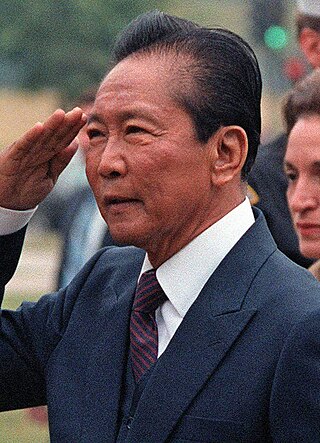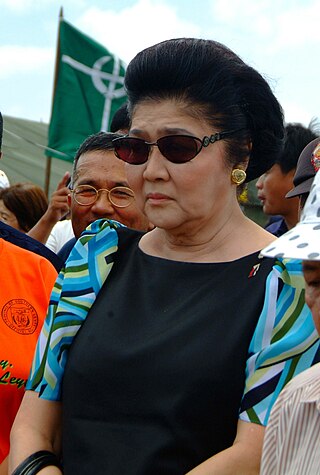Related Research Articles

Ferdinand Emmanuel Edralin Marcos Sr. was a Filipino politician, lawyer, dictator, and kleptocrat who was the 10th president of the Philippines from 1965 to 1986. He ruled under martial law from 1972 until 1981 and kept most of his martial law powers until he was deposed in 1986, branding his rule as "constitutional authoritarianism" under his Kilusang Bagong Lipunan. One of the most controversial leaders of the 20th century, Marcos's rule was infamous for its corruption, extravagance, and brutality.

Imelda Romualdez Marcos is a Filipino politician who was First Lady of the Philippines from 1965 to 1986, wielding significant political power after her husband Ferdinand Marcos placed the country under martial law in September 1972. She is the mother of current president Bongbong Marcos.

Ferdinand "Bongbong" Romualdez Marcos Jr., commonly referred to by the initials PBBM or BBM, is a Filipino politician who is the 17th and current president of the Philippines. Marcos is also the secretary of agriculture, holding the post in concurrent capacity. He previously served as a senator from 2010 to 2016. He is the second child and only son of 10th president, kleptocrat and dictator Ferdinand Marcos Sr. and former first lady Imelda Romualdez Marcos.

Maria Imelda Josefa Remedios "Imee" Romualdez Marcos is a Filipina politician and former actress serving as a Senator since 2019. She is the daughter of Ferdinand Marcos and former first lady Imelda Marcos and the older sister of the current president, Bongbong Marcos. She previously served as governor of Ilocos Norte from 2010 to 2019 and as representative of Ilocos Norte's 2nd district from 1998 to 2007.

Martial law in the Philippines refers to the various historical instances in which the Philippine head of state placed all or part of the country under military control—most prominently during the administration of Ferdinand Marcos, but also during the Philippines' colonial period, during the second world war, and more recently on the island of Mindanao during the administrations of Gloria Macapagal Arroyo and Rodrigo Duterte. The alternative term "martial law era" as applied to the Philippines is typically used to describe the Marcos martial law period specifically.

The Solid North refers to the regional voting bloc of the northern provinces of the Philippines for politicians of Ilocano descent, more particularly the Marcos family and their allies, and also economic issues affecting the Ilocanos in general such as the tobacco industry. Often included in Solid North are the provinces in the Ilocos Region, Cordillera Administrative Region (CAR), and Cagayan Valley.
The Conjugal Dictatorship of Ferdinand and Imelda Marcos is a 1976 memoir written in exile by former press censor and propagandist Primitivo Mijares. It details the inner workings of Philippine martial law under Ferdinand Marcos from the perspective of Mijares.

The bust of Ferdinand Marcos along the Aspiras–Palispis Highway in Tuba, Benguet, Philippines, was a 30-meter (98 ft) concrete monument of former Philippine President, dictator and kleptocrat Ferdinand Marcos. The monument became a subject of controversy as its construction displaced indigenous Ibaloi residents in the sparsely populated area, and Ibaloi residents were reportedly forced to sell their ancestral land at very low prices. The monument was destroyed in December 2002, with the New People's Army, the armed wing of the Communist Party of the Philippines, taking credit for its destruction.
This is a list of candidates in the 2016 Philippine presidential and vice presidential elections.

The Bantayog ng mga Bayani, sometimes simply referred to as the Bantayog, is a monument, museum, and historical research center in Quezon City, Philippines, which honors the martyrs and heroes of the struggle against the dictatorship of former President Ferdinand Marcos.

The burial of Ferdinand Marcos, a former Philippine President who ruled as a dictator for 14 years, took place on November 18, 2016, at the Libingan ng mga Bayani in Fort Bonifacio, Metro Manila, Philippines. Marcos had been elected the 10th President of the Philippines in 1965, but declared Martial Law in 1972 before his final constitutionally allowed term was over, holding on to power until his overthrow by the People Power Revolution in 1986.
The term "Marcos mansions" refers to at least 50 upscale residences in the Philippines of the family of President Ferdinand Marcos. These are aside from the various overseas landholdings of the Marcos family, which are spread around the world. The Supreme Court of the Philippines considers these landholdings as part of the "ill-gotten wealth" of the Marcos family, based on the definitions set forth in Republic Act No. 1379, which had been passed in 1955.
Certain associates of former Philippine President Ferdinand Marcos, historically referred to using the catchphrase "Marcos cronies", benefited from their friendship with Marcos – whether in terms of legal assistance, political favors, or facilitation of business monopolies, during his administration. Marcos critics, and the local and international press began referring to these individuals as "cronies" during the latter days of the Marcos dictatorship, and the Philippine government – especially the Presidential Commission on Good Government (PCGG) – continued using the term after the ouster of Marcos in 1986.

The Marcos family is a political family in the Philippines. They have established themselves in the country's politics, having established a political dynasty that traces its beginnings to the 1925 election of Mariano Marcos to the Philippine House of Representatives as congressman for the second district of Ilocos Norte; reached its peak during the 21-year rule of Ferdinand Marcos as president of the Philippines that included his 14-year dictatorship beginning with the declaration of Martial Law throughout the country; and continues today with the political careers of Imelda Marcos, Imee Marcos, Sandro Marcos and reached a fresh political apex with the presidency of Bongbong Marcos.

The Marcos family, a political family in the Philippines, owns various assets that Philippine courts have determined to have been acquired through illicit means during the presidency of Ferdinand Marcos from 1965–1986. These assets are referred to using several terms, including "ill-gotten wealth" and "unexplained wealth," while some authors such as Belinda Aquino and Philippine Senator Jovito Salonga more bluntly refer to it as the "Marcos Plunder".
Bonifacio Parabuac Ilagan, often known just as Boni Ilagan, is a Filipino playwright, screenwriter, filmmaker, journalist, and editor best known for numerous socially-conscious, critically-acclaimed works in theater, film and television, most notably the films The Flor Contemplacion Story (1995), Dukot, Sigwa, and Deadline ; as well as his first play, Pagsambang Bayan (1976), which portrayed the human rights violations of the Marcoses. He is also one of the prominent torture victims who survived the Marcos dictatorship.
Historical distortion regarding Ferdinand Marcos is a political phenomenon in the Philippines. Ferdinand Marcos was the country's president between 1965 and 1986. Distortion, falsification, or whitewashing of the historical record regarding this period, sometimes referred to using the phrases "historical denialism", "historical negationism", or "historical revisionism" as a euphemism for negationism, is an academically documented phenomenon linked to the return of Marcos' immediate family and political allies to government positions, as well as the hero's burial of Marcos himself in 2016. It continues Marcos' own efforts to create a cult of personality for himself, which in itself involved various forms of historical distortion.

The 2022 presidential campaign of Bongbong Marcos began on October 6, 2021, when he filed his candidacy for the 2022 Philippine presidential election under the Partido Federal ng Pilipinas. Bongbong Marcos, a former senator of the Philippines from 2010 to 2016, is the son of former president Ferdinand Marcos.
Tallano gold refers to a set of interrelated conspiracy theories and internet scams which claim that before Spain colonized the Philippines, the archipelago and surrounding territories were ruled by a certain Tagean Tallano family, that the family owned a vast amount of gold, and that former president Ferdinand Marcos obtained his family's unexplained wealth by receiving some of the Tallano gold as payment for the legal services he allegedly provided to the Tallano family. Offshoots of the conspiracy theories include tales that the country's national hero José Rizal survived his execution, that the gold reserves were used to fund the Vatican, or that the gold was instrumental in starting the World Bank.
Protests against President Bongbong Marcos have occurred mainly in the Philippines even before the inauguration of the president on June 30, 2022. Protest have been mostly conducted by progressive and opposition groups due to the violent and plunderous legacy of the Marcos family during the martial law era and throughout the rule of his father, former President Ferdinand Marcos; unpaid real-estate taxes; alleged electoral fraud during the 2022 presidential elections; instances of fake news and historical distortion; cases of human rights violations such as extra-judicial killings and the continuing war on drugs; and other social issues. Protests against the president have also included grievances against Vice President Sara Duterte as well as seeking of accountability from his predecessor Rodrigo Duterte. Mobilizations have also been held by Filipino-Americans and other solidarity and progressive groups abroad such as in United States, Australia, and Canada.
References
- ↑ Lalu, Gabriel Pabico (2021-02-18). "Group exhorts Filipinos: Stay vigilant vs 'attempts' of Marcoses to return to Malacañang". The Philippine Daily Inquirer . Retrieved 2021-05-15.
- 1 2 Marcelo, Elizabeth (February 5, 2016). "Martial law victims launch campaign vs Bongbong Marcos". GMA News Online. Retrieved 2020-06-05.
- 1 2 Reysio-Cruz, Matthew (January 16, 2020). "DepEd asked to review books' depiction of martial law years". Inquirer. Retrieved 2020-06-05.
- 1 2 Sabillo, Kristine Angeli (May 4, 2016). "WATCH: Clueless millennials meet martial law victims". Inquirer. Retrieved 2020-06-05.
- ↑ Villaluz, Nicole (2017-01-06). "The Power of Social Media: How a Viral Video Might Have Changed the Course of Philippine History". When In Manila. Retrieved 2020-06-05.